Chia vs flax vs hemp: which seed is supreme?
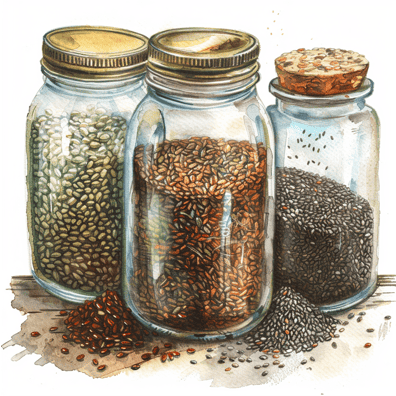
Do you have time to be eating chia, flax and hemp seeds everyday? I don’t. While these seeds are all super healthy, the question is: Between chia vs flax vs. hemp seeds, which one deserves top spot in your pantry?
Here we will explore which one is best for your skin, your waistline and health. You will also discover the #1 mistake people make that make some of these seeds absolutely worthless.
Hi, I’m Hazel
I gave up on skincare after years of issues with acne and sensitive skin.
But after going plant-based, my skin cleared up and even started to glow. Now I help women reveal their natural beauty with simple, delicious plant-based food.
I also used to be a nurse, and love nerding out on nutritional science (high-quality science, that is).

As usual, this post is based on the best nutritional evidence I could find with a focus on the simplest, most delicious foods
…because who has time to waste on actions that don’t work?
The quick version:
Flaxseeds are the stand-out choice. Not only do they have way more lignans than chia (which is great for your skin) and beat chia in a head-to-head comparison for weight loss. Hemp seeds however…meh. Sure they have protein but even meat-free vegans eat enough protein as long as they aren’t going hungry.
What Are Chia Seeds?
Originating from the seeds of the Salvia hispanica plant, these tiny edible seeds have been a staple in diets for centuries. More likely you have seen them in the popular ‘chia seed pudding’ recipes.
They’re renowned for being packed full of essential nutrients like protein (15-25%), dietary fibre (18-35%), and fat (15-35%) suggesting that they are a nutritional powerhouse for any healthy lifestyle (1). The high fibre content in chia seeds is meant to help with digestive health and keeping you full for longer, which can aid in weight management.
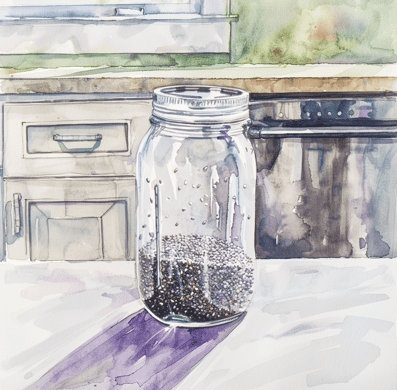
Just a tablespoon of chia can transform your smoothie or pudding into a nutrient-dense treat (not really though, if they are whole seeds, see the weigh loss section below). When soaked, their gelatinous texture makes them a fun and versatile ingredient in various recipes. Although a friend of mine prefers to describe her lunchtime chia seed mix as having a ‘pond’ like texture. But each to their own.
But, are chia seeds all that they are touted to be?
What Are Flax Seeds?
Flax seeds, aka linseeds, come from flax plants and are also packed with essential nutrients. They are rich in omega-3 fatty acids, and high fibre content, which are excellent for digestive health and maintaining stable blood sugar levels. Flax seeds also contain lignans, which have antioxidant properties and can benefit your skin. Especially if you add them into your daily diet.
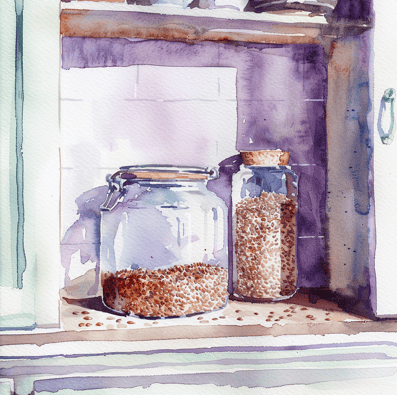
While chia seeds and hemp seeds have soared in recognition and popularity, flaxseeds are really the underdog of the trio. They are just trucking along quietly at the supermarket, being used everywhere as an easy trick for replacing eggs in plant-based baked goods, but not really celebrated in the way they deserve.
That’s about to change.
What Are Hemp Seeds?
Hemp seeds come from the seeds of the hemp plant, and are famed for being are incredibly nutritious and versatile. Hemp seeds are a plant-based protein, providing all nine essential amino acids. This makes them a popular choice for those following a plant-based diet. They are also rich in healthy fats like omega-3 and omega-6 fatty acids, particularly linoleic acid and alpha-linolenic acid, which are great for heart health and reducing inflammation.
Additionally, hemp hearts are also hemp seeds, but specifically refer to the soft inside of the seed itself (aww!).
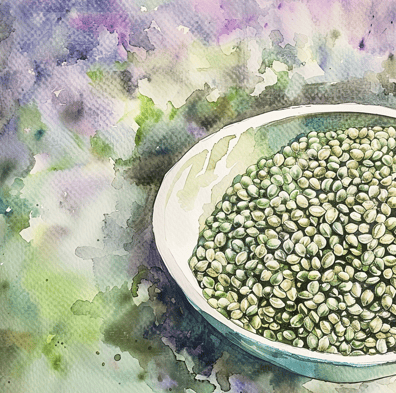
You can easily add a couple tablespoons of hemp seeds to your salads, smoothies, and even baked goods to boost your intake of essential nutrients. Or roast them for a tasty snack.
The question is, should you?
Which one is best for my skin?
When is comes to chia vs flax vs hemp, each seed has its own benefits. Flaxseeds have the most promising proof to support them.
Chia seeds
- Are rich in antioxidants, including B vitamins (thiamine, riboflavin, niacin, folic acid), that help fight free radicals and reduce oxidative stress (2).
- Are high in fibre which good for gut health and blood sugar stabilisation, leading to clearer skin.
- A source of peptides that may protect against aging by preventing the breakdown of elastin, hyaluronic acid, and collagen (3).
- A source of omega-3 fatty acids, linoleic, and oleic acids, which are required for healthy skin (4)
Flax seeds
- Able to reduce skin sensitivity, improve skin barrier function, and enhance hydration. In a study, the equivalent of 1.5 teaspoons of flaxseeds reduced skin reddening and improved smoothness (5).
- The world’s most concentrated source of lignans, with 15 times more lignans than other seeds, including chia seeds (6). Lignans are important for skincare as they provide antioxidant protection and help balance hormones.
- Inflammation fighters by combating oxylipins, a pro-inflammatory compound contributing to inflamm-aging (7).
- Improve wound healing and blood flow due to their omega-3 fatty acids (8).
- Improves artery function, enhancing blood flow and nutrient delivery to the skin (9).
Hemp seeds
- Have antioxidant, antimicrobial, and anti-inflammatory properties (10).
- Have an ideal omega-6 to omega-3 fatty acid ratio, which supports clear skin and less inflammation (11).
- Contain vitamins A and E, and multiple minerals (such as calcium, magnesium, iron, manganese, and zinc) which can support skin health (12).
- Hemp seed oil is well-known for its ability to nourish and hydrate the skin, making it look and feel healthier, though it didn’t outperform olive oil in studies (13).
- The ratio of omega-3 to omega-6 fatty acids in hemp seed oil is less beneficial compared to chia seed oil and flaxseed oil (14).
Choosing any of these edible seeds may give your skincare routine a nourishing touch. However flax seeds lead the way in terms of outcomes that have proof, as opposed to just containing nutrients we believe are beneficial.
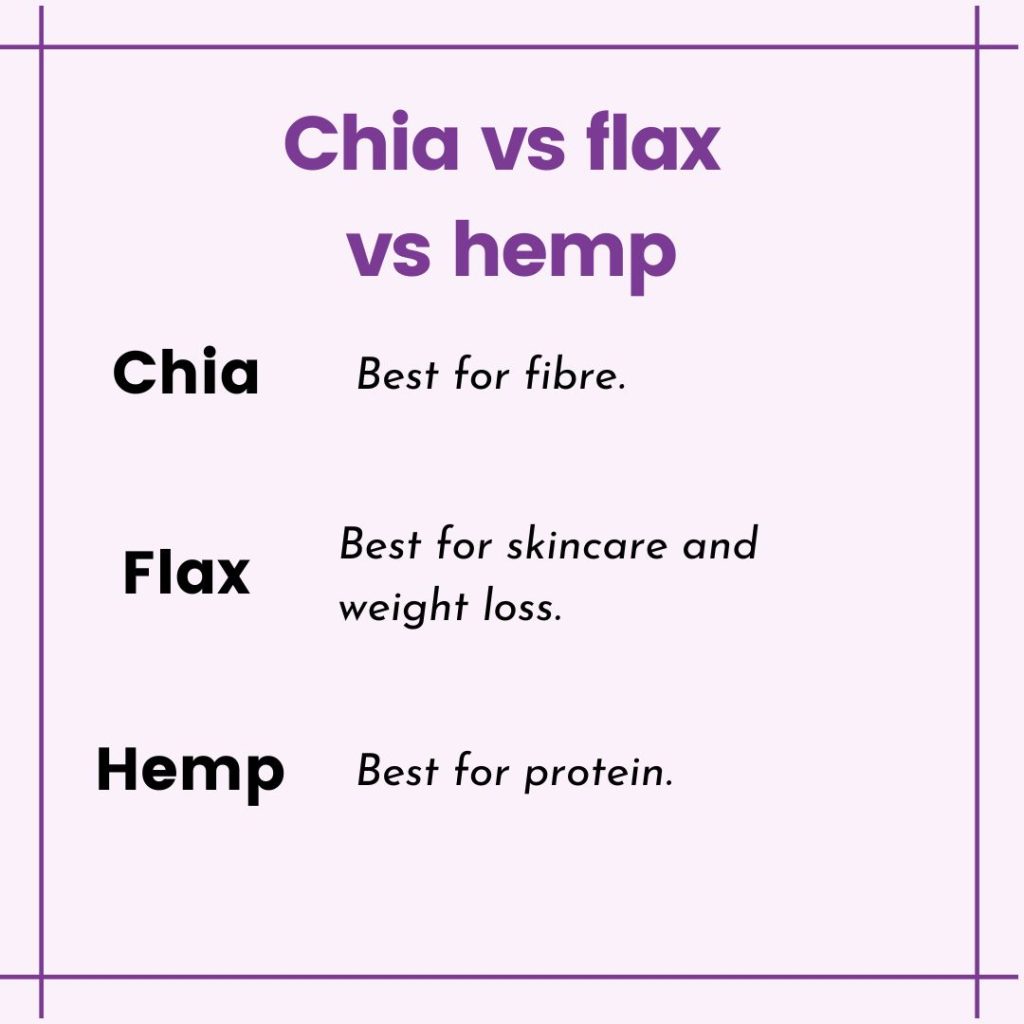
Which one is best for my waistline?
If weight management is a priority, the chia vs flax vs hemp choice is clear: it’s flaxseeds.
Chia seeds
- Their high fibre content helps keep you feeling full longer, reducing overall calorie intake. (15). This only works if you ground the chia seeds up. Two research studies looked at the impact of chia seeds on weight loss. The first got people to eat the chia seeds in their whole form for 3 months and nothing happened (16). Another got people to eat ground chia seeds everyday for 6 months and they slimmed down (17).
Flax seeds
- Packed with insoluble fibre, flax seeds help maintain a healthy digestive system and promote a feeling of fullness.
- Flaxseeds are associated with improving carbohydrate metabolism (18).
- The evidence supporting flaxseed for weight loss is stronger compared to chia seeds, which means that flaxseeds are a better bet for weight loss. But as with chia seeds, using whole flax seeds will also be ineffective. You must grind them up first.
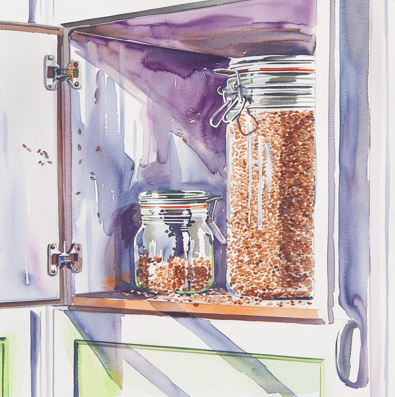
Hemp seeds
I’m not sure if hemp seeds are particularly effective for losing weight. As a plant-based food they are more likely to support weight loss compared to meat-based foods.
What other health benefits should I know about?
When considering chia vs flax vs hemp seeds, there are many benefits to choose from:
Chia seeds
- Boost digestive health due to their high fibre content (19). In fact chia seeds beat out flaxseeds for fibre, containing 34.4 g (per 100g) compared to 27.3g (20).
- Provide sustained energy and can help stabilise blood sugar levels (21).
- Chia seed components are support heart health by reducing blood pressure, platelet aggregation, cholesterol, and oxidation (21).
Flax seeds
- Reduces breast pain during menstruation (22).
- Assists cancerprevention, such as breast cancer (23).
- Improve hormonal balance and ovarian function (1 tablespoon a day) (24).
- Support heart health by helping to lower cholesterol levels and blood pressure (25). They are also better than chia seeds for supporting healthy blood flow (26).
- Have anti-inflammatory properties (27).
- Support brain healthsuch as mental fatigue (28).
- Can improve fasting blood sugar, triglycerides, cholesterol and haemoglobin A1C levels in people with diabetes (29).
Hemp seeds
There is limited research on the impact of hemp seeds on human health, and much of this is further limited to supplements. Therefore the following is possible, but not yet proven:
- Promote muscle recovery and improve mood due to their high protein content and high digestibility of this protein (30).
- The essential fatty acid content in hemp seeds is converted into metabolised to eicosapentaenoic acid (EPA) and docosahexaenoic acid which may support brain health and heart health, and reduces inflammation (31). However further research in humans is required.
Therefore all of three are super seeds, not just a trendy addition to your diet. But again, flaxseeds appears to come out on top for improving your overall health and well-being.
The big mistake making chia seeds and flaxseeds useless

If you scrolled straight here then you missed the science from the weight loss section, which showed us that whole chia seeds don’t result in weight loss but ground chia seeds do.
It turns out that our human stomachs can’t break down the seeds outer layer, so we never crack into the goodies inside.
Unfortunately most people aren’t talking about this and are still happily eating their chia seed puddings without any of the health and beauty benefits. This goes for flaxseeds too (Austria).
So, put down that chia pudding and opt for a smoothie or oats instead.
Unless you love that ‘pond’ taste of course…
Which One Tastes the Best?
As I mentioned above, a big focus at Beautiful With Plants is that we eat plant-based foods in the most delicious way possible. Otherwise all this great nutritional evidence shared comes to nothing.
However this isn’t really relevant with chia vs flax vs hemp seeds. All are reported to have a nutty flavour but in my opinion none have actually changed the taste my meals (usually oatmeal).
Although I have never tasted hemp seed butter, so I can’t speak to that.
Ultimately the best one for you depends on your personal preference but I don’t think taste is going to be a deal-breaker here.

And the Winner Goes To…
After diving into the unique benefits of chia, flax, and hemp seeds, it’s clear that each has its strengths. However, if I had to crown one as the overall champion, flax seeds take the prize. Their impressive impact on weight management, combined with their potent skincare benefits and additional health advantages, make them a standout choice. Remember, the key is to consume them ground to unlock their full potential. So, while all three seeds are fantastic additions to a healthy, plant-based diet in the chia vs flax vs hemp seeds debate, flax seeds emerge as the most worthy of your time and effort.
What Are the Easiest Ways to Eat Them?
Incorporating these seeds into your diet can be simple and delicious. Here are some easy ways to enjoy them:
Chia seeds:
- Add a tablespoon of chia (ground!) to your morning smoothie for a nutrient boost.
- Make chia pudding by soaking the seeds in almond milk overnight.
- Sprinkle chia seeds on your salad for added texture and nutrition.
Flax seeds:
- Mix ground flax seeds into your oatmeal or yogurt for a breakfast that’s a nutritional powerhouse.
- Use ground flax seeds in baking recipes like muffins and bread.
- Create a flaxseed egg substitute for vegan recipes by mixing one tablespoon of ground flax seeds with three tablespoons of water.
Hemp seeds:
- Sprinkle some tablespoons of hemp seeds on your salad or soup for a complete protein source.
- Add hemp seeds to your smoothie for an extra boost of essential nutrients.
- Incorporate hemp seeds into homemade protein bars or energy balls.
These easy methods ensure you can enjoy the health benefits of theseseeds without adding much effort to your routine.
Conclusion
To recap, chia, flax, and hemp seeds each offer unique and powerful health benefits. You will benefit from any choice you make. Whether you’re looking to improve your skincare, manage your weight, or boost your overall health, these seeds can make a big difference. By incorporating them into your daily diet, you can take advantage of their nutritional benefits with minimal effort. Remember, when it comes to chia vs flax vs hemp, the best choice depends on your personal health goals and preferences. So, why not try all three and see which one rules them all for you?
References
Most references below will link to the original peer-reviewed study itself. However, sometimes I will link to a video over at NutritionFacts.org instead, which is by far the single best resource of brutally transparent nutritional evidence you will ever see. Dr Greger tells a great story about the realities of the science and if I think you will benefit more from one of his videos, the link will take you there instead.
Happy nerding!
- Ashura, K.K., Lillian, D. K., Oscar, K., & Leonard, M. P. R. (2021). Nutritional, health benefits and usage of chia seeds (Salvia hispanica): A review. African Journal of Food Science, 15(2), 48–59. https://doi.org/10.5897/ajfs2020.2015
- Muñoz, Loreto & Cobos, Angel & Diaz, Olga & Aguilera, José. (2013). Chia Seed (Salvia hispanica): An Ancient Grain and a New Functional Food. Food Reviews International. 29. 394-408. 10.1080/87559129.2013.818014.
- Aguilar-Toalá JE, Liceaga AM. Identification of chia seed (Salvia hispanica L.) peptides with enzyme inhibition activity towards skin-aging enzymes. Amino Acids. 2020;52(8):1149-1159. doi:10.1007/s00726-020-02879-4
- Silva LA, Verneque BJF, Mota APL, Duarte CK. Chia seed (Salvia hispanica L.) consumption and lipid profile: a systematic review and meta-analysis. Food Funct. 2021;12(19):8835-8849. Published 2021 Oct 4. doi:10.1039/d1fo01287h
- Neukam K, De Spirt S, Stahl W, et al. Supplementation of flaxseed oil diminishes skin sensitivity and improves skin barrier function and condition. Skin Pharmacol Physiol. 2011;24(2):67-74. doi:10.1159/000321442
- Nemes, S.M. and Orsat, V. (2011). Evaluation of a Microwave-Assisted Extraction Method for Lignan Quantification in Flaxseed Cultivars and Selected Oil Seeds. Food Analytical Methods, 5(3), pp.551–563. doi:https://doi.org/10.1007/s12161-011-9281-6.
- Caligiuri SPB, Parikh M, Stamenkovic A, Pierce GN, Aukema HM. Dietary modulation of oxylipins in cardiovascular disease and aging. Am J Physiol Heart Circ Physiol. 2017;313(5):H903-H918. doi:10.1152/ajpheart.00201.2017
- Soleimani Z, Hashemdokht F, Bahmani F, Taghizadeh M, Memarzadeh MR, Asemi Z. Clinical and metabolic response to flaxseed oil omega-3 fatty acids supplementation in patients with diabetic foot ulcer: A randomized, double-blind, placebo-controlled trial. J Diabetes Complications. 2017;31(9):1394-1400. doi:10.1016/j.jdiacomp.2017.06.010
- Khandouzi N, Zahedmehr A, Mohammadzadeh A, Sanati HR, Nasrollahzadeh J. Effect of flaxseed consumption on flow-mediated dilation and inflammatory biomarkers in patients with coronary artery disease: a randomized controlled trial. Eur J Clin Nutr. 2019;73(2):258-265. doi:10.1038/s41430-018-0268-x
- Montero L, Ballesteros-Vivas D, Gonzalez-Barrios AF, Sánchez-Camargo ADP. Hemp seeds: Nutritional value, associated bioactivities and the potential food applications in the Colombian context. Front Nutr. 2023;9:1039180. Published 2023 Jan 11. doi:10.3389/fnut.2022.1039180
- Oseyko M, Sova N, Lutsenko M, Kalyna V. Chemical aspects of the composition of industrial hemp seed products. Ukr Food J. (2019) 8. doi: 10.24263/2304-974X-2019-8-3-11
- Montero L, Ballesteros-Vivas D, Gonzalez-Barrios AF, Sánchez-Camargo ADP. Hemp seeds: Nutritional value, associated bioactivities and the potential food applications in the Colombian context. Front Nutr. 2023;9:1039180. Published 2023 Jan 11. doi:10.3389/fnut.2022.1039180
- Callaway J, Schwab U, Harvima I, et al. Efficacy of dietary hempseed oil in patients with atopic dermatitis. J Dermatolog Treat. 2005;16(2):87-94. doi:10.1080/09546630510035832
- Malko R, Larraza I. Microwave-Assisted, Base-Catalyzed Synthesis of Fatty Acid Methyl Esters from Seeds and Fish Oil Supplements. Lipids. 2019;54(11-12):715-723. doi:10.1002/lipd.12199
- Ayaz A, Akyol A, Inan-Eroglu E, Kabasakal Cetin A, Samur G, Akbiyik F. Chia seed (Salvia Hispanica L.) added yogurt reduces short-term food intake and increases satiety: randomised controlled trial. Nutr Res Pract. 2017;11(5):412-418. doi:10.4162/nrp.2017.11.5.412
- Nieman DC, Cayea EJ, Austin MD, Henson DA, McAnulty SR, Jin F. Chia seed does not promote weight loss or alter disease risk factors in overweight adults. Nutr Res. 2009;29(6):414-418. doi:10.1016/j.nutres.2009.05.011
- Vuksan V, Jenkins AL, Brissette C, et al. Salba-chia (Salvia hispanica L.) in the treatment of overweight and obese patients with type 2 diabetes: A double-blind randomized controlled trial. Nutr Metab Cardiovasc Dis. 2017;27(2):138-146. doi:10.1016/j.numecd.2016.11.124
- Nowak W, Jeziorek M. The Role of Flaxseed in Improving Human Health. Healthcare (Basel). 2023;11(3):395. Published 2023 Jan 30. doi:10.3390/healthcare11030395
- Scapin, Schmidt, M., & Prestes, R. (2016). International Food Research Journal, 23(6), 2341–2346. http://www.ifrj.upm.edu.my/23%20(06)%202016/(5).pdf
- Muñoz, Loreto & Cobos, Angel & Diaz, Olga & Aguilera, José. (2013). Chia Seed (Salvia hispanica): An Ancient Grain and a New Functional Food. Food Reviews International. 29. 394-408. 10.1080/87559129.2013.818014.
- Khalid W, Arshad MS, Aziz A, et al. Chia seeds (Salvia hispanica L.): A therapeutic weapon in metabolic disorders. Food Sci Nutr. 2022;11(1):3-16. Published 2022 Dec 15. doi:10.1002/fsn3.3035
- Flaxseeds for breast pain
- Fabian CJ, Kimler BF, Zalles CM, et al. Reduction in Ki-67 in benign breast tissue of high-risk women with the lignan secoisolariciresinol diglycoside. Cancer Prev Res (Phila). 2010;3(10):1342-1350. doi:10.1158/1940-6207.CAPR-10-0022
- Phipps WR, Martini MC, Lampe JW, Slavin JL, Kurzer MS. Effect of flax seed ingestion on the menstrual cycle. J Clin Endocrinol Metab. 1993;77(5):1215-1219. doi:10.1210/jcem.77.5.8077314
- Nowak W, Jeziorek M. The Role of Flaxseed in Improving Human Health. Healthcare (Basel). 2023;11(3):395. Published 2023 Jan 30. doi:10.3390/healthcare11030395
- Rodriguez-Leyva D, Weighell W, Edel AL, et al. Potent antihypertensive action of dietary flaxseed in hypertensive patients. Hypertension. 2013;62(6):1081-1089. doi:10.1161/HYPERTENSIONAHA.113.02094
- Rahimlou M, Jahromi NB, Hasanyani N, Ahmadi AR. Effects of Flaxseed Interventions on Circulating Inflammatory Biomarkers: A Systematic Review and Meta-Analysis of Randomized Controlled Trials. Adv Nutr. 2019;10(6):1108-1119. doi:10.1093/advances/nmz048
- Gholami Z, Akhlaghi M. The effect of flaxseed on physical and mental fatigue in children and adolescents with overweight/obesity: a randomised controlled trial. Br J Nutr. 2021;126(1):151-159. doi:10.1017/S0007114520003888
- Mani UV, Mani I, Biswas M, Kumar SN. An open-label study on the effect of flax seed powder (Linum usitatissimum) supplementation in the management of diabetes mellitus. J Diet Suppl. 2011;8(3):257-265. doi:10.3109/19390211.2011.593615
- Potin, François & Saurel, Rémi. (2020). Hemp Seed as a Source of Food Proteins. 10.1007/978-3-030-41384-2_9.
- Takic M, Pokimica B, Petrovic-Oggiano G, Popovic T. Effects of Dietary α-Linolenic Acid Treatment and the Efficiency of Its Conversion to Eicosapentaenoic and Docosahexaenoic Acids in Obesity and Related Diseases. Molecules. 2022;27(14):4471. Published 2022 Jul 13. doi:10.3390/molecules27144471